
What Happens to Our Brains When We Read?
The human brain is, in my opinion, the weirdest and most fascinating thing in this world. This might sound like a good old human superiority complex mixed in with some narcissism, but in my defense, I am only human. However, the reason why the brain has fascinated me has more to do with self-awareness of the irony of the human condition, rather than a self-obsession with my own brain. The mere fact that our entire species has evolved and survived until this point, both against nature and against each other, is absurd. Things get even weirder when you realize that a lot of the things that we have claimed differentiate us from other animal species are in many ways unnatural to our brains, like reading. For many centuries, be it as a way to justify colonialism or exploitation of nature and animals, humans have pointed to reading and writing as characteristics of superiority. But if reading and writing are abnormal activities for the human brain, how well can most of us actually read? And are most of us reading as well as we think we are? All the answers to these questions are neatly held in our brain’s evolutionary traits.
Books About the Reading Brain
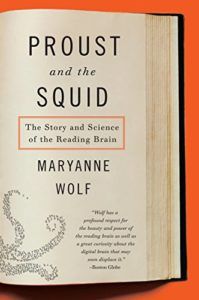
I was fascinated by Proust and the Squid and started seeking out other books by Maryanne Wolf, such as Reader Come Home, about reading in the digital age, as well as a few other articles on the neuroscience of reading. I wanted to look at my brain as I am most proud of it; when it’s creating vast worlds in my imagination and transporting me; when I felt most like myself: while reading.
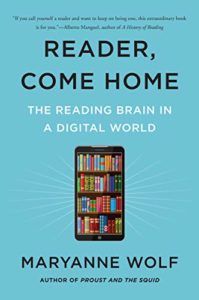
The jumping-off point when looking at the reading brain is that reading is an unnatural cognitive process. It means that it must be taught actively, differently from language. Language is a natural process for most humans and can be seen as a cognitive function developed through evolution. Reading, on the other hand, is very much like other practice-based knowledge or creative thinking. It’s something that doesn’t come naturally for most people, and is deeply influenced by your social condition and learning abilities.
In Proust and The Squid, Wolf heavily focuses on learning disabilities such as dyslexia and how profoundly misunderstood they are by the educational community. Children have a more flexible brain than adults, and they can wire their neural connections faster and to greater success. So, something deeply natural to the brain is learned by rewiring already preexisting forms of human cognition, such as seeing or listening. If you want to get into the literal aspects of it, children use a more significant part of their brains when reading than adults do. They are confronting several different barriers of proficiency that go beyond simply decoding symbols. Critical thinking and understanding the meaning behind a word or a text are often overlooked in children learning how to read, especially if they have no trouble decoding alphabetic characters and phonetics.
But Wolf argues this is something that should be paid greater attention to. Many children develop high functioning reading disabilities, which don’t allow them to become proficient readers later in life. They cannot understand hidden meanings or allegories or even submerge themselves in the plot of a narrative. But because they are seen as being able to read when asked to, they are not made to develop their reading brains further—thus creating a barrier between reading as a physical act and as a psychological one.
This really got me thinking about the many reasons people in my life have told me why they don’t like to read or wish they could. In many ways, if we are not influenced and pushed by primary caretakers or teachers to go beyond our reading capabilities as young children, we might get stuck. Reading, like most things in life, is developed through a habit. Chances are that if you have a love of reading or consider yourself to be a voracious reader, you had someone teach you that appreciation as a young child—someone who taught you about the many worlds hidden behind words.
More recently, I read Reader Come Home by Wolf, in which she discusses the possible evolutions reading might take due to the overwhelming presence of digital technology. It isn’t by any means a “ereaders suck” kind of thing, but rather how our cognitive understanding of reading might change because we are exposed to faster information and media at all times. If you want to know about what happens in your brain, I think this book is much more accessible than Proust and The Squid, which is much denser and focuses on the many reading challenges Wolf has encountered during her research.
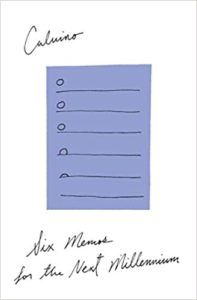
This got me thinking a lot about my current reading habits. Although I thankfully have not experienced the many reading blocks a lot of people are having during these uncertain times, I have noticed a sharp decrease in my attention span and my ability to submerge myself in stories. Overwhelming thoughts constantly plague me, and I check social media and the news much more than I usually did. Another interesting personal development that I noticed when reading Reader Come Home was how psychologically I had been much more willing to read on my computer and ereader than I previously was. The sense of being connected and being productive has become intrinsically linked to my digital connection, even if I am reading something for pleasure. In contrast, my actual work performance and creative thinking have declined.
My Struggles As A Reader
I knew it wasn’t a question of my routine, since I recently explored it as a factor of my reading and creative productivity. My reading habits and screen usage had also not changed so much to warrant a possible cognitive explanation. So I went looking for answers beyond my brain’s physiology. After all, reading as an act is much more poetic and abstract than a purely mechanical one. I believed I had to try and understand what was going on in my mind to understand why my cognitive concentration had changed. Enter Zora Neale Hurston and Alberto Manguel, two wildly different authors who have recently had an enormous impact on my reading life.
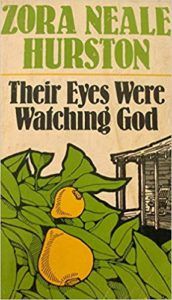
Recently I picked up the new collection of Hurston’s short stories, written during her time living in Harlem. In the introduction, the editor advises the reader that this collection should preferably be read out loud or listened to if you would like to have the complete experience of Hurston’s powerful writing. I took their advice and proceeded to get the audiobook. I knew from the moment I started rereading her work that I had lost some part of that ability I acquired so many years ago. Still, it soon came back to me once I could listen to the audiobook narrator. Their magnificent performance helped me mimic the linguistic sounds of Hurston’s characters in my mind, and I gained a more fruitful understanding of my reading. But why was that? Why is it that as readers we have to return, we have to find ourselves working to enter a narrative even as adults?
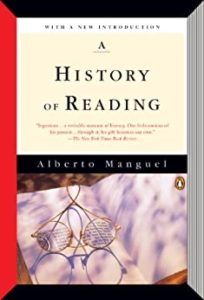
However, Manguel’s most interesting essay on the development of reading is “How Pinocchio Learned to Read.” In this essay, he not only summarizes his argument on why reading is a developmental issue, but also perfectly intersects with Wolf’s work, bringing into the discussion the clear cultural and political reasons why reading is an important skill to master beyond practicalities, which he clearly outlines in three points: “First, the mechanical process of learning the code of the script. Second, the learning of the syntax by which such a code is governed. Third, the learning of how the inscriptions in such a code can serve to help us know in a deep, imaginative, and practical way ourselves and the world around us.”
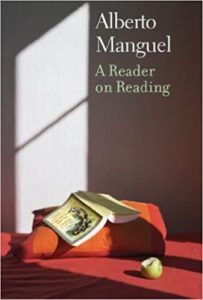
Wolf’s work is mainly dedicated to breaking this barrier so that people who can read become readers. You and I might consider ourselves readers simply for our love of books. Still, the quintessential part of that is our capability to create new neurological connections in our brains that defy survival instinct or realistic thinking, beyond the simple meaning of language. Manguel again uses this as an example of Pinocchio’s use of language, as well as the characters in Alice in Wonderland. Alice is a realist but an incisive thinker who understands that relativity and creativity in language are not the same things. She thus understands the power of words, while for the characters in Pinocchio knowledge, especially language-based education, is disdained and often misrepresented.
As he points out in this passage: “Language can allow the speaker to remain on the surface of thought, mouthing dogmatic slogans and commonplaces in black and white, transmitting messages rather than meaning, placing the epistemological weight on the listener (as in ‘you know what I mean?’). It can attempt to re-create an experience, give shape to an idea, explore in-depth, and not only the intuition of a revelation on the surface. For the other boys [Pinocchio’s classmates], this distinction is invisible. For them, the fact that Pinocchio speaks ‘like a printed book’ is enough to label him an outsider, a traitor, a recluse in his ivory tower.”
So, the reading brain is more powerful and complex than a simple skill-building, or innate trait of humans that differs us from other species. As I said in the beginning, I am not a neuroscientist. However, the ways in which biology and philosophy intersect when it comes to reading are fascinating to me, a field I can see myself exploring more every day as I try to think about what I see when I read and why I see it critically. In these unsettling times when reading can be a source of both solace and anxiety, I think it’s important to understand how our mind and body collide. In doing so, maybe we can get some further insight into ourselves and break vicious cycles of understanding reading as a practical and standardized issue.
Reading should be appreciated and understood through the amazing evolutionary feat of the brain that it is. More so, it should not be exclusionary of those who require different approaches to learning it. I think if many more governments and schooling systems focused on combining the scientific background to reading and philosophical reasoning for teaching it, we would have a society with a much better understanding of each individual’s learning curve. But most of all it was interesting exploring my own reading challenges, I did not find all the answers, but nonetheless it was helpful to understand how my brain acted when I was reading.














